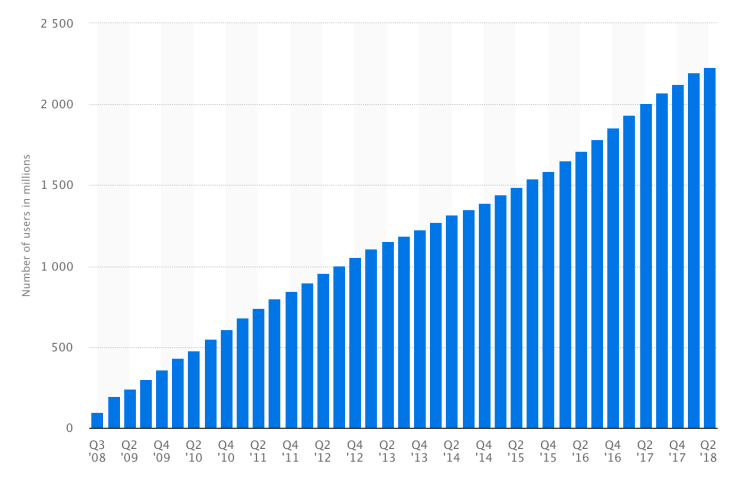
Way back in the year 2000, Google introduced Adwords, which has been heralded as the start of geomarketing. This digital advertising tool allowed companies to target consumers within a particular area based upon the IP addresses of their computers. The concept of geomarketing therefore is not new. What is new however is the convalescence of a mature marketing practice with a technology that we have embraced as an intimate part of our lives. Mobile phones are now used as though they are an extension of the self, and indeed in a 2014 study (Cheever, Rosen, Carrier, Chazez, 2014) it was found that separation from our mobile devices causes significant increase in anxiety. With the growing use of social media since publication, the effects are now likely to be inflated.

For example, Zephoria Digital Marketing (2018) claim that Facebook had 1.15 billion daily users on the mobile platform in December 2016, which marked 23% growth on the previous year. This number is now likely to be considerably higher.

It’s been well documented that your mobile phones track where you are. Using algorithms, it knows when you are at home, when you are work and wherever else you may travel. This is just the start. For example, courtesy of what3words, the entire globe has been broken down into 3x3mtr grids, each with a combination of three words which can be used to find exact locations. My house is broken up into four grids, with a different section for the kitchen, the living room and the bathroom. Although the world of geomarketing hasn’t reached these levels of sophistication yet, there is no reason why one couldn’t be subjected to food advertising whilst using your device in the kitchen, home decorations in the living room and loo rolls when…you know where this is going.

“Put simply, geomarketing brings clarity to the many where questions with which businesses are confronted –e.g., where are my customers located?…Where are my target groups? “(GfK, 2016)
This highlights the power of targeting individuals based on their location at any given moment. Marketers now have the ability to reach consumers when they are best placed to make a purchasing decision using techniques such as Geofencing, which sends an automated message to a consumer offering an incentive to make a purchase when one is in close proximity to the store. An example of this comes from Vouchercloud, an app which does exactly as described on behalf of companies that sign up to the service.
Facebook has (relatively) recently introduced “offline” targeting, which allows businesses to show adverts on the platform aimed at people who have physically been into their store. “This feature allows businesses to re-engage in-store audiences with more relevant and compelling campaigns, as well as create lookalike audiences.” (Facebook, 2017)
The value of this intimate knowledge of consumer activities is clear. However, this blend of technologies also comes with issues that need to be considered. Least of all, the controversial privacy implications of tracking an individual’s whereabouts. In a recent discussion with fellow students, the geomarketing activities of The National Trust were explored. The charity actively tracks users’ locations on their mobile devices in order to send them relevant content, and the discussions were based upon how intrusive this practice is. Interestingly, the consensus of this discussion seemed to be that this type of tracking was acceptable because the organisation was deemed a trustworthy one-
“I too am comfortable with trustworthy organisations like The National Trust targeting myself and others to attract more support.” (Steven McRae, 2018)
However, those who accept Facebook’s geo-navigation activities simply do not know who is using this data, as it can be utilised by any organisation willing to pay for the advertising space.
“However if the plan is to move into a…millennial market, I don’t feel they would find geonav intrusive as they are far more accustomed to having their data tracked by organisations.” (Georgia Durham, 2018)
This idea seems to suggest that accepting tracking by organisations is a progressive societal evolution. Although the distinction between younger and older users is perhaps contentious, it is apparent that the users of these platforms accept these practices, as numbers of active users continues to increase numbers of active users continues to increase.
Aside from this, geomarketing also presents a risk of exasperating socio-economical divides. When targeting specific locations, it is possible to target areas based upon their average economic position. It has been found in traditional marketing, that economically deprived areas are subjected to more advertising of fast food and tobacco. Users therefore risk facing a marketing “bubble” in which they are targeted only for products which reflect their economic surroundings, and for poor areas this means unhealthier products.

This is also a risk for marketers, as although targeting by location may reinforce brand loyalty, it may also prevent brand exposure to new markets thereby stemming the flow of new consumers.
Therefore, geomarketing comes with myriad opportunities, however marketers must be aware that to track a user’s location may lead to scepticism from consumers unless your brand is a trusted one, and ultimately may lead to a stagnation of market share unless treated as part of a larger practice, and not as a panacea.
References
Nancy A., Cheever, Larry D., Rosen, L. Mark Carrier., Amber Chavez. (2014) Out of sight is not out of mind: The impact of restricting wireless mobile device use on anxiety levels among low, moderate and high users, Computers in Human Behavior. (Volume 37)
Zephoria Digital Marketing (2018), The Top 20 Valuable Facebook Statistics – Updated July 2018. Retrieved July 28th, 2018 from https://zephoria.com/top-15-valuable-facebook-statistics/
GfK (2016) Geomarketing in Practice: Achieving market optimisation through spatial analysis. Retrieved July 28th, 2018 from http://www.alpine-space.org/2007-2013/uploads/tx_txrunningprojects/Methodology_-_Geomarketing_in_practice.pdf
Facebook (2017) Introducing More Ways to Drive Offline Outcomes. Retrieved July 28th, 2018 from https://www.facebook.com/business/news/introducing-more-ways-to-drive-offline-outcomes
McRae S. (2018) PEOPLES PERCEPTIONS. Retrieved July 28th, 2018 from https://vle.exeter.ac.uk/mod/forum/discuss.php?d=106423
Durham, G. (2018) Surprising. Retrieved July 28th, 2018 from https://vle.exeter.ac.uk/mod/forum/discuss.php?d=106440


Great title Jack….. Although it’s a little worrying to think that even ‘that’ moment in our day will be captured through data!
Thanks for including my forum comment in your blog.
I still stand by my point about allowing the organisations and brands that I trust to offer me relevant content.
Transparency will surely aid brands that I am not as familiar with to also start targeting me. Utilising the guidelines from the GDPR and other future frameworks that are being developed will surely increase peoples trust in what goes on online???
I guess another issue altogether will be the amount of (or lack of) self control people have when constantly targeted with geomarketing. We all know what its like when you walk into certain stalls (IKEA) knowing that you went there to get a specific item and walk out with 100 candles, an extra large pack of napkins and some kitchen utensil that looked cool….. Just like the battle parents have with their children when faced with adverts, consumers will also have to increase their will power not to act on every call to action thrown their way through Geomarketing. What do you think?
Steven
LikeLike
Hi Jack,
Like Steven, I really liked your title and I think your blog prompts some questions of which I think the biggest is how our concepts towards privacy are going to change. I think people are becoming increasingly sanguine about their privacy and accept compromises to their privacy as a tradeoff against the mobile services that they get.
I’ve wondered if millennials view privacy differently from a (late) boomer like me. I grew up in an era of communists under every bed and learning not to trust “The Man”. The Vietnam war and other conflicts, the women’s movement and rotten politics of the 70’s and 80’s eroded our trust in Government and institutions in general. Even now I feel uneasy about web security. Yet Millenials seem not to harbour these anxieties, something borne out by the below cited 2017 Forbes article. There is an awareness and apathy towards data security and an expectation that things will fail from time to time.
Apart from security issues, I definitely see that geotargeted marketing offers the opportunity to better match consumer wants with product and service offerings. Rather than being bombarded by general advertising, we may be able to opt in or out of things offered to us in such a way that it’s not intrusive. The melding of our online and real world is something we’re all going to need to get used to.
(2018). Retrieved from https://www.forbes.com/sites/larryalton/2017/12/01/how-millennials-think-differently-about-online-security/#48a060c6705f
LikeLike
Hi Jack
Great blog, really enjoyed reading it and agree, great title!
Firstly, it’s definitely worth noting how rapidly I think this level of targeting will come into play! With the speed of technology and the incredible advances we’ve already made, it might not be too long!
There are some brands already harnessing the capabilities of geomarketing with one of my favourites being LoweBots! Robots designed by the home-improvement store Lowe’s that understand the store layout and are able to communicate where certain goods are in the store to customers with an inquiry! I personally think that this is one of the most genius uses of the technology and if I’m honest, uses it in a far less intrusive way! Mapping is incredibly impressive but there is a sense, as you’ve discussed, that it could become intrusive!
I think the most appropriate uses of geomarketing (ie ones which don’t feel like they are intrusive) are the ones that use your location in reference to their own and advertise the product/service to you that way. I personally also think that this is a far more effective use of the technology because when you’re out shopping, you’re doing just that and probably far more susceptible to marketing messages than when you’re in your own home! I’m not sure it will ever extend to that level when I really think about it.
All in all we’re just gearing up to a form of marketing that has the capability to be so specific, it’s really going to change the industry forever. Location is just another factor that we can use to target the right consumers and get a better return on investment and stop wasting time marketing to people for whom the ad is irrelevant!
Despite some quite scary elements, it’s an exciting time to be a marketer!
References:
Goldman, J. (2017). 3 Brands Mastering Geomarketing: Here’s What You Can Learn. Retrieved from: https://www.inc.com/jeremy-goldman/3-brilliant-geomarketing-campaigns-from-brands-and-what-you-should-learn.html
Long, M. (2018). Unleash the Power of Geotargeting for Your Facebook Ads. Retrieved from: https://www.adweek.com/digital/unleash-the-power-of-geotargeting-for-your-facebook-ads/
LikeLike
Hi Jack! As always, great post!
I especially liked how you picked up Georgia’s quote and claimed, that this may „suggest that accepting tracking by organisations is a progressive societal evolution.“
I just wanted to throw in White’s & Le Cornu’s „Visitors & Residents“ typology here, with Visitors being more sceptical, and Residents therefore being more open minded about Geo-tracking and -marketing. Is this what you mean with „the distinction between younger and older users is perhaps contentious“?
Additionally applying the Visitors & Residents typology here would explain another phenomenon in this context. What I notice on myself is, that my attitude towards Geo-tracking sometimes varies, depending on the fact if I am currently acting as a visitor or as a resident. If I pull out my phone and just want to quickly google something for instace, and I get confronted with a geo-marketing activity in this moment, I often find it annoying and even intrusive. Though, if I spend some time on e.g. social media or browsing the web, I am sometimes far more open towards this kind of technology & marketing. Nevertheless I do not see this as the only influence on the user’s experience with geo-targeting of course. I am agreeing with you & Steven 100%, that trust is also key here!
But I can only speak for myself here, what are your thoughts on this?
http://daveowhite.com/vandr/
LikeLike
Hi Jack,
A great post and very informative! Not sure that I like the future of being spied on through my own mobile phone – a bit creepy – but as you mentioned it could be something we would have to live with – part of progressive societal evolution. Apart from all the challenges stated, Geomarketing could also easily lead to brand overexposure due to its widely-use in every business. I can’t imagine I wouldn’t get annoyed as a customer when walking in the shopping mall hearing the sound of push notification whenever passing by a store. This type of overmarketing via excessive notifications could result in location turn-off.
A research conducted by one of universities in Korea has found that people prefer marketing media doesn’t affect their personal life and over marketing by mobile caused consumers to have a high level of psychological stress! (https://www.consumerinterests.org/assets/docs/CIA/CIA2014/the%20effect%20of%20excessive%20marketing%202014%20park%20yoo.pdf)
Well, I believe Geomarketing is a brilliant tool as long as it is used properly and the marketers know what they are doing.
Regards,
Yuling
LikeLike